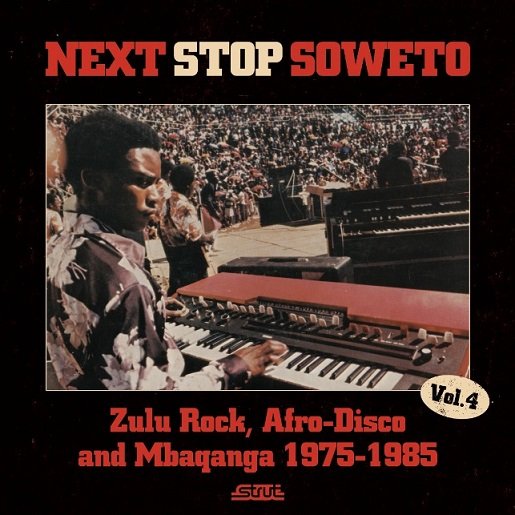Schlock-Wire: Explore Afro-Disco And Funk With Strut's NEXT STOP SOWETO 4 In March
Fans of worldbeat, take note: Strut Records is reviving a popular African music compilation series from its recent past. Next Stop Soweto 4 brings back the titular series, this time with a volume that explores the disco and funk-influenced sounds that popped up in South Africa during the '70s and early '80s. It sounds like a real adventure of cultural anthropology, unearthing 15 tracks rarely if ever heard outside South Africa. Read on for all ambitious Afro-funk details, including a full track listing and a free song sample...
NEXT STOP SOWETO 4
 Strut continue their acclaimed ’Next Stop Soweto’ series in March 2014 as they return to the rich archives of South African music to spotlight the fertile era of the late ’70s and early ’80s. Tightly controlled by oppressive Apartheid laws, South Africa’s music scene had nevertheless progressed into myriad new directions, embracing funk, soul, rock and disco.The era marked a crossroads for the country’s black musicians. While domestic stars of mbaqanga like Mahotella Queens had temporarily disbanded during the onslaught of disco, younger artists like T.Y. Boys and Elias Maluleke embraced and progressed the style in new ways, adding punk and disco touches to the familiar bassline swing.Imported US R&B and the powerful socio-political message of the Afro- American soul stars, championed by pioneering producers like Hamilton Nzimande in South Africa since the ’60s, continued to be a powerful force. Influenced by bands as diverse as War, Edwin Starr and Yes, as well as producers like Norman Whitfield, South African collectives including Xoliso, Marumo and Kabana new soul and rock directions, led by Zulu lyrics, township harmonies and top level musicianship.For all South African musicians during this time, it was a considerable struggle to operate. Followingthe Soweto Uprising in ’76, bands would play live shows despite live performance restrictions with freedom of gathering strictly curtailed and curfews imposed. The Radio Bantu group of stations were among the few media outlets for black musicians to get their music heard. For most, music was no way to make a living and many musicians were forced to hold down other jobs.Despite the harsh conditions, the period documented in ’Next Stop Soweto 4’ was a hugely important one for South African music, setting the stage for the ’world music’ explosion of the 1980s when South African artists like the reformed Mahotella Queens, Hugh Masekela and Ladysmith Black Mambazo would find a global crossover audience and Western artists like Malcolm McLaren and Paul Simon with his infamous ’Graceland’ project would embrace the sounds of the townships.As with all previous volumes, ’Next Stop Soweto 4’ is compiled by Duncan Brooker. It will be released on 1CD, 2LP and digital formats with physical formats featuring sleeve notes by author Francis Gooding along with artist interviews, rare photos and sleeve artwork.
Strut continue their acclaimed ’Next Stop Soweto’ series in March 2014 as they return to the rich archives of South African music to spotlight the fertile era of the late ’70s and early ’80s. Tightly controlled by oppressive Apartheid laws, South Africa’s music scene had nevertheless progressed into myriad new directions, embracing funk, soul, rock and disco.The era marked a crossroads for the country’s black musicians. While domestic stars of mbaqanga like Mahotella Queens had temporarily disbanded during the onslaught of disco, younger artists like T.Y. Boys and Elias Maluleke embraced and progressed the style in new ways, adding punk and disco touches to the familiar bassline swing.Imported US R&B and the powerful socio-political message of the Afro- American soul stars, championed by pioneering producers like Hamilton Nzimande in South Africa since the ’60s, continued to be a powerful force. Influenced by bands as diverse as War, Edwin Starr and Yes, as well as producers like Norman Whitfield, South African collectives including Xoliso, Marumo and Kabana new soul and rock directions, led by Zulu lyrics, township harmonies and top level musicianship.For all South African musicians during this time, it was a considerable struggle to operate. Followingthe Soweto Uprising in ’76, bands would play live shows despite live performance restrictions with freedom of gathering strictly curtailed and curfews imposed. The Radio Bantu group of stations were among the few media outlets for black musicians to get their music heard. For most, music was no way to make a living and many musicians were forced to hold down other jobs.Despite the harsh conditions, the period documented in ’Next Stop Soweto 4’ was a hugely important one for South African music, setting the stage for the ’world music’ explosion of the 1980s when South African artists like the reformed Mahotella Queens, Hugh Masekela and Ladysmith Black Mambazo would find a global crossover audience and Western artists like Malcolm McLaren and Paul Simon with his infamous ’Graceland’ project would embrace the sounds of the townships.As with all previous volumes, ’Next Stop Soweto 4’ is compiled by Duncan Brooker. It will be released on 1CD, 2LP and digital formats with physical formats featuring sleeve notes by author Francis Gooding along with artist interviews, rare photos and sleeve artwork.


